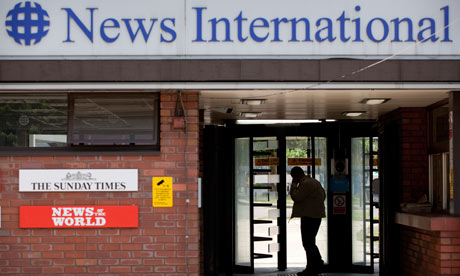Officers who seized material during the phone-hacking raid were confronted by photographers and staff, hearing told
News of the World office in Wapping. Photograph: David Levene
News International "obstructed" the original inquiry into criminal activity at the News of the World, refusing to hand over evidence to police of phone-hacking and thwarting a raid on its east London offices, senior detectives have told the Leveson inquiry into press ethics.
Keith Surtees, an investigating officer with the Metropolitan police hacking inquiry in 2006, told Lord Justice Leveson how officers were photographed and feared they might be attacked when they searched the newspaper for evidence.
Surtees said there was "some difficulty" conducting the search and recalled how four officers seized material from Goodman's desk and were then confronted by photographers and challenged by staff on the legality of their raid.
The police were concerned that staff could "offer some form of violence", although this did not happen. Surtees told Leveson the officers tried to get their forensic team into the building but were refused entry. There followed "a tense standoff".
"They were left outside. Our officers were effectively surrounded and photographed and not assisted in any way, shape or form," he said.
An internal memo from Surtees described the paper as "obstructive". The Met then wrote to publisher News International's law firm Burton Copeland asking it to hand over documents relating to payments to Glenn Mulcaire, the private investigator who formerly worked for the paper and was arrested at the same time as Goodman on suspicion of intercepting voicemails.
They also sought floorplans of desks and accompanying telephone numbers to try to establish if three other News of the World journalists had been involved in hacking. News International rebuffed the requests.
The inquiry's counsel, Robert Jay QC, put it to Philip Williams, the senior investigating officer on the Met's phone-hacking team in 2006: "All you got from the solicitors acting for News of the World was extremely limited, evidentially." Williams replied: "Yes."
At the time police strongly suspected Mulcaire was not just hacking the phones of members of the royal household, but had also targeted politicians, celebrities, sports people and unspecified "state securities".
The inquiry heard how the mobile phone voicemail of one member of the royal household had been accessed 520 times.
Leveson also heard that the News of the World was even spying on its sister paper the Sun. Rebekah Brooks, the former chief executive of News International, was hacked twice a week from 2005 when she was theSun's editor.
http://www.guardian.co.uk/media/2012/feb/29/leveson-inquiry-police-news-of-the-world-phone-hacking?CMP=twt_gu

